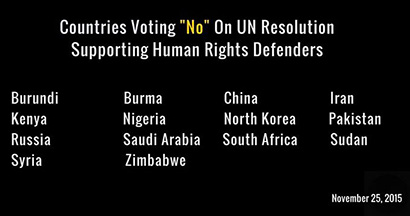South Africa’s shame: Votes against human rights in UN

South Africa aligns itself with repressive countries at the UN
South Africa has shamefully joined 13 mostly anti-gay countries in voting against an important UN resolution supporting human rights activists around the world.
On Wednesday, countries at the UN voted 117 in favour and 14 against, with 40 abstentions, to send the Draft Resolution on Human Rights Defenders to the General Assembly.
The resolution condemns violence against and intimidation of human rights defenders as well as calling upon all states to refrain from any act of intimidation or reprisal against them.
South Africa, along with Burundi, Burma, China, Iran, Kenya, Nigeria, North Korea, Pakistan, Russia, Saudi Arabia, Sudan, Syria and Zimbabwe, were the countries to vote against the resolution.
Our nation once again finds itself siding with a group of states that not only oppress and discriminate against LGBT people but also have shocking human rights records in general.
The US Ambassador to the United Nations said on Facebook that the vote against the resolution was “terrible”.
She slammed the 14 countries for not “supporting and protecting people who bravely promote and defend human rights.”
Chester Samba, Director of Zimabwe LGBT rights group GALZ, told Mambaonline that the resolution had “suffered as a result of countries like Zimbabwe that do not value the promotion and protection of Human rights.”
He added, however, that it was “surprising that South Africa chose to align with countries like Zimbabwe, China, Russia and Nigeria.”
Karim Lahidji, President of the International Federation for Human Rights (FIDH), said it was “problematic” that a democracy such as South Africa voted no, despite owing “its anti-apartheid struggle and its beacon Constitution to a solid civil society movement.”
Clayson Monyela, Spokesman for the Department of International Relations and Co-operation, told Times Live that South Africa believes the resolution interferes with national sovereignty. He also claimed that the government disagreed with the resolution on issues of sources of funding and the definition of human rights defenders.
Monyela told Radio 702 that government was concerned about the foreign funding of NGOs; referring to the Southern African Litigation Centre (SALC) taking it to court in a bid to force it to arrest Sudanese President Omar al-Bashir, who is wanted on charges of genocide and crimes against humanity at the International Criminal Court.
“There are NGOs that are funded by foreign governments. These NGOs become implementers of their foreign policies and that’s why some of them even have the guts to take some countries to court,” he argued.
Ahead of the vote, delegates from China and the Russian Federation said they opposed the resolution because it would give human rights defenders “special rights”.
China’s speaker claimed that in recent years, certain Western countries had used the protection of “human rights defenders” as an excuse to interfere in the domestic affairs of developing countries.
“The fact that the resolution was not adopted by consensus reinforces our concerns about the shrinking space for civil society organisations and human rights defenders across the globe,” commented Gerald Staberock, Secretary General of the World Organisation Against Torture (OMCT).
“Now more than ever it’s essential that all of us who are supportive of independent civil society join our voices to defend not only the legitimacy of their work but also to reaffirm how essential it is for any society wanting to advance human rights and the rule of law.”
- Facebook Messenger
- Total166
We live in a modern age & world. Can you BELIEVE that some countries in the word are still stuck in the Middle-Ages…? OMG!?!?? Wake-up and smell the bacon people. We don’t follow the Dark-age laws anymore. This is the year 2015. LGBT people are all over the world & moving between all of you.. We are NOT going to repress ourselves & pretend that we’re straight. Get use to the fact that your college, neighbor, boss or even your friend might be gay or lesbian or transsexual. Some people can be so daft! And to read a story like THIS, that state the fact that your home country voted against something so important like this, is just discouraging, sad & demoralizing. WTF South-Africa, get with the system! You, the government, through stuff like apartheid in our faces on a daily basis. Now, more that 20 years later, you are doing EXACTLY the same. You are discriminating against a certain group of people… You, the government, the members of the ANC, ALL of you guys are making a joke of yourselves! You are all a bunch of ass wipes! Treat people like YOU WOULD LIKE TO BE TRETED….. Just remember, what goes around comes around. “Fuckers get fucked in the long run.” Someday you will get what’s coming to you. Someday, not to far in the distant future, one of your stupid decisions will come back to bite you in the but…!!!!! – I just hope I’m around to witness it all.
#OMG_What_A_Homophobic_bunch_of_dingleberries.
Africa – wall to wall parasitic scum.
China, and possibly Iran, is telling our Government which way to vote at the UN. It goes totally against what most South Africans stand for and in therefor not representative of us as a Country. Its just politics. We need China, we need Iran. We are being bullied into voting this way. It’s not what we stand for.